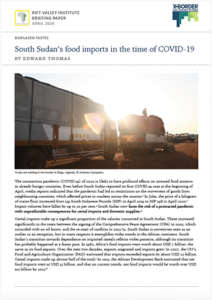The coronavirus pandemic (COVID-19) of 2020 is likely to have profound effects on stressed food systems in already hungry countries. Even before South Sudan reported its first COVID-19 case at the beginning of April, media reports indicated that the pandemic had led to restrictions on the movement of goods from neighbouring countries, which affected prices in markets across the country. In Juba, the price of a kilogram of maize flour increased from 159 South Sudanese Pounds (SSP) in April 2019 to SSP 298 in April 2020. Import volumes have fallen by up to 50 per cent. South Sudan now faces the risk of a protracted pandemic with unpredictable consequences for cereal imports and domestic supplies.
This briefing is a product of the X-Border Local Research Network, a component of DFID’s Cross- Border Conflict—Evidence, Policy and Trends (XCEPT) programme, funded by UKaid from the UK government. The programme carries out research work to better understand the causes and impacts of conflict in border areas and their international dimensions. It supports more effective policymaking and development programming and builds the skills of local partners.




